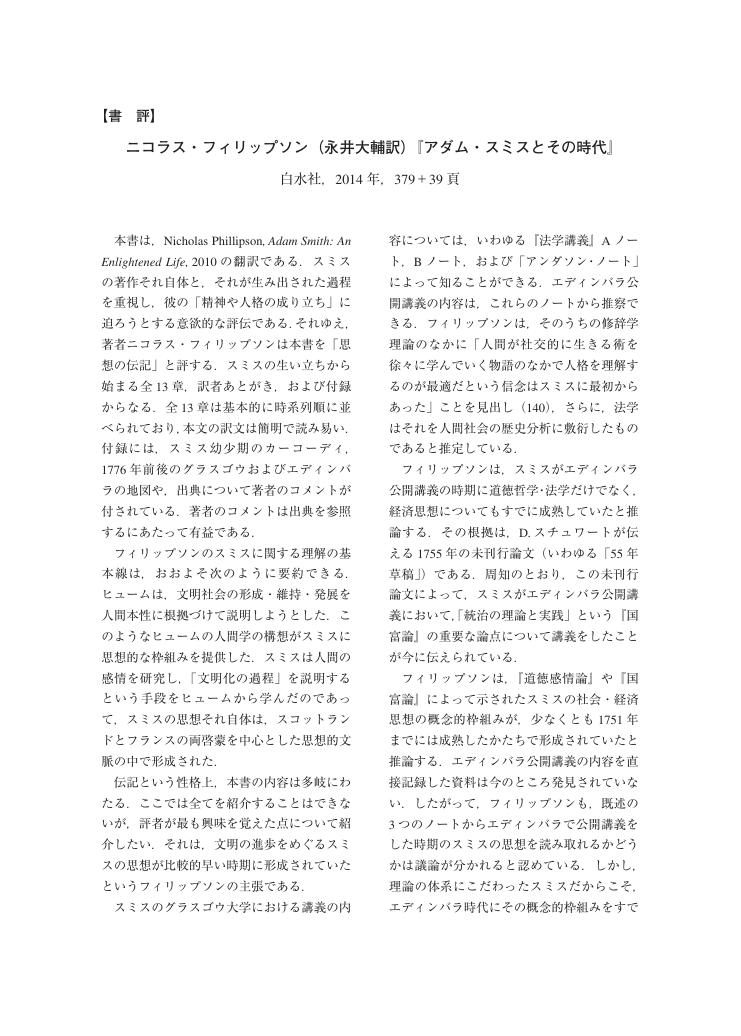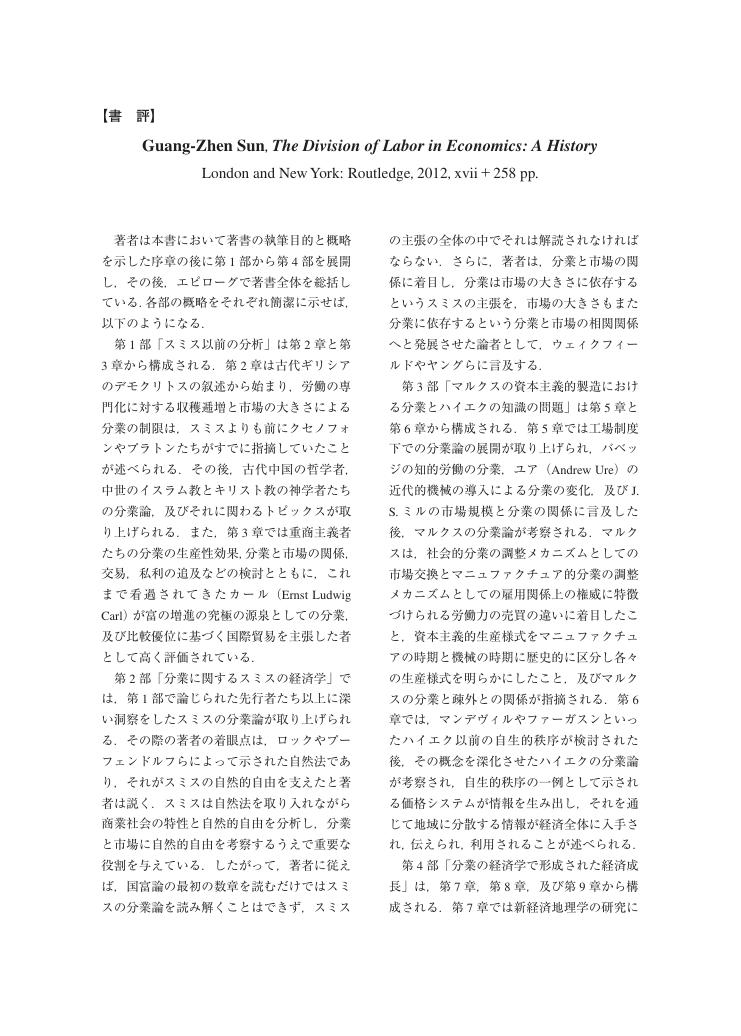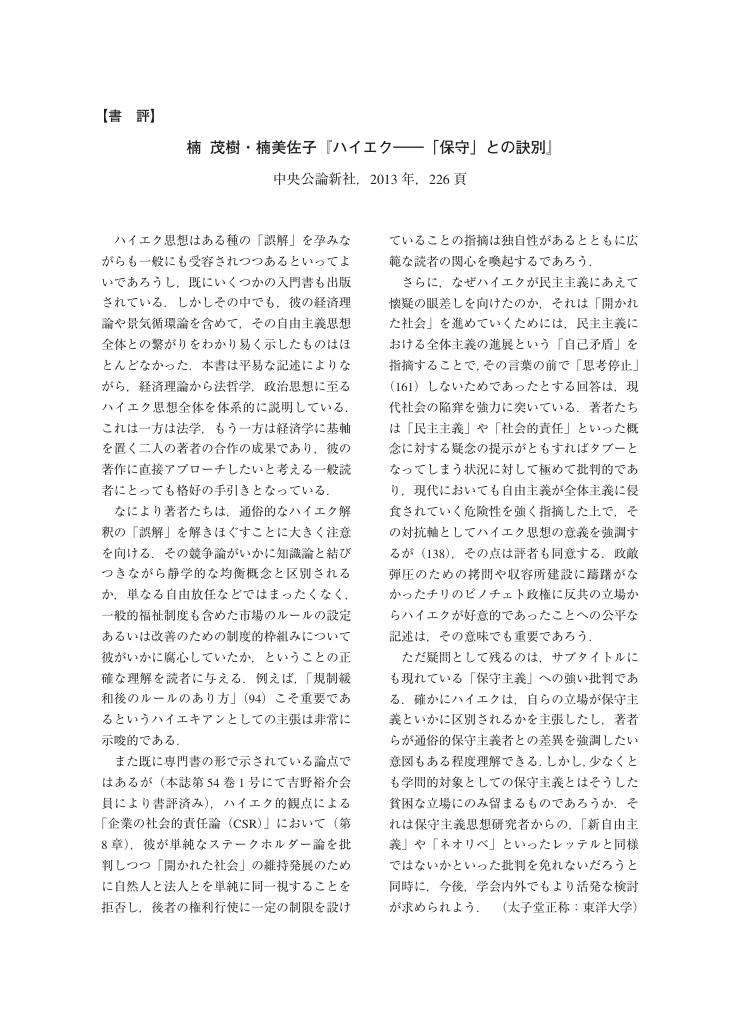- 著者
- 福田 進治
- 出版者
- 経済学史学会
- 雑誌
- 経済学史研究 (ISSN:18803164)
- 巻号頁・発行日
- vol.57, no.1, pp.102-103, 2015 (Released:2019-11-26)
- 著者
- Anna Carabelli
- 出版者
- The Japanease Society for the History of Economic Thought
- 雑誌
- 経済学史研究 (ISSN:18803164)
- 巻号頁・発行日
- vol.57, no.1, pp.104-105, 2015 (Released:2019-11-26)
- 著者
- 山田 正範
- 出版者
- 経済学史学会
- 雑誌
- 経済学史研究 (ISSN:18803164)
- 巻号頁・発行日
- vol.57, no.1, pp.106-107, 2015 (Released:2019-11-26)
- 著者
- 山﨑 耕一
- 出版者
- 経済学史学会
- 雑誌
- 経済学史研究 (ISSN:18803164)
- 巻号頁・発行日
- vol.57, no.1, pp.108-109, 2015 (Released:2019-11-26)
- 著者
- 篠原 久
- 出版者
- 経済学史学会
- 雑誌
- 経済学史研究 (ISSN:18803164)
- 巻号頁・発行日
- vol.57, no.1, pp.112-113, 2015 (Released:2019-11-26)
- 著者
- 川脇 慎也
- 出版者
- 経済学史学会
- 雑誌
- 経済学史研究 (ISSN:18803164)
- 巻号頁・発行日
- vol.57, no.1, pp.114-115, 2015 (Released:2019-11-26)
- 著者
- 山崎 聡
- 出版者
- 経済学史学会
- 雑誌
- 経済学史研究 (ISSN:18803164)
- 巻号頁・発行日
- vol.56, no.2, pp.152-153, 2015 (Released:2019-11-30)
- 著者
- 千賀 重義
- 出版者
- The Japanease Society for the History of Economic Thought
- 雑誌
- 経済学史研究 (ISSN:18803164)
- 巻号頁・発行日
- vol.57, no.1, pp.1-24, 2015 (Released:2019-08-27)
Abstract: This paper seeks to examine Takuya Hatoriʼs research on classical economics, clarify his main findings, and appraise their intellectual and historical significance. Hatoriʼs personal his-tory as a scholar of classical economics was largely divided into two periods based on the differences in the objects, methods, and results of his study. In the first half of his research activities, he addressed the problem of the relation between bourgeois revolution and mercan-tilist economics to illuminate the historical meanings of classical economics. Following Yoshihiko Uchidaʼs suggestions, Hatori grasped the mercantilist period in England after the Glorious Revolution of 1688 as a kind of social and political crisis of the country and identi-fied the role of Adam Smithʼs economics as presenting the solution to this crisis. Hatori went on to focus on the classical theories of capital accumulation and argued that classical eco-nomics was formed historically with economistsʼ visions growing and changing by way of recognizing the civil and civilized development of the capitalist economy. In the latter half of his life, Hatori devoted himself to analyzing the theories of classical economics. He spoke of “a working hypothesis which should be positioned as the starting point for our work” and claimed that classical economists presupposed “pure capitalism” when formulating and presenting their economic theories. According to Hatori, Smith, Mal-thus, and Ricardo all struggled to solve “fundamental problems” owing to this supposition about pure capitalism. In his study of Ricardoʼs theory, Hatori argued that Ricardo maintained the theory of absolute value and grasped rent as a nominal value. Indeed, through a detailed investigation of the documents in the Works of Ricardo, Hatori may have even become the first scholar in the world to criticize Piero Sraffaʼs interpretation of the corn-ratio theory. It is difficult to speculate as to why Hatori, in the latter half of his career, changed his approach to the study of classical economics. It appears that he gradually liberated himself from the influence of Uchida and felt more affinity with the economics of Kozo Uno. As the background of intellectual change, we might refer first to the success of Japanese capitalism without realizing the ideal of “civil society” and second to the “student protests” in the late 1960s. JEL classification numbers: B11, B12, B31.
1 0 0 0 OA イギリスにおける経済学史研究の形成 1870年代-1920年代
- 著者
- 西沢 保
- 出版者
- 経済学史学会
- 雑誌
- 経済学史研究 (ISSN:18803164)
- 巻号頁・発行日
- vol.57, no.1, pp.25-50, 2015 (Released:2019-08-27)
Abstract: This paper examines the history of economic thought studies in Britain in the age of neoclas-sical and historical economics from 1870 to 1914 (and thereafter). The historicism and his-torical methods of this age appeared to be behind not only the making of economic history but also the formation of history of economic thought studies. Economic history, after taking off in the last quarter of the 19th century largely because of the foundation of the English his-torical school, formation of the Economic History Society presided by W. J. Ashley, and issue of the Economic History Review in 1927, is institutionally separated from the Royal Econom-ic Society. What was the history of economic thought? In the decline and fall of English classical political economy, a new cohort of econo-mists such as Cliffe Leslie, Ingram, Bagehot, and Jevons asserted themselves. They opposed the methods of the classical school, particularly Ricardoʼs economic reasoning, and their un-orthodox literary review sought the free examination of new opinions and theories. Bagehotʼs Postulates was “a landmark in the history of economics,” Jevons was “the first of the distin-guished tribe of economic bibliomaniacs,” and Foxwell first caught the affliction and then made economic library with the “most splendid” work ever to be collected. The rise of a new cohort of economists and the activities and works of Jevons and Foxwell were the founda-tions of the history of economic thought. Jevons “discovered” Cantillonʼs Essai and Higgs conducted studies of Cantillon and Physiocrats, while Jevons wrote a history of mathematical economics and utility theory. Foxwellʼs collection of economic literature provided a thor-oughly historical edition of the Wealth of Nations. This was completed by Cannan, preceded and helped by Bonarʼs Catalogue of the Library of Adam Smith as well as John Raeʼs Life of Adam Smith. Bonar also wrote two books on Malthus. Toynbeeʼs Industrial Revolution, economic history integrated with the history of eco-nomic thought, generated a “reformist” group of economic and social historians. Ingramʼs History of Political Economy was a systematic study from a Comteian perspective; he was a leader among a group of men who successfully introduced humanitarianism into political economy or economics. Marshall was among them, and economic history and the history of economic thought were someway integrated into his economics. However, with the profes-sionalization and institutionalization of economics and economic history, the boundaries be-tween the disciplines of economics and economic history began to be marginalized and the history of economic thought became peripheral to both. JEL classification numbers: B13, B15.
1 0 0 0 OA ファーガスンからスミスへ 「注釈」にみる初期ガルヴェの道徳哲学
- 著者
- 大塚 雄太
- 出版者
- 経済学史学会
- 雑誌
- 経済学史研究 (ISSN:18803164)
- 巻号頁・発行日
- vol.57, no.1, pp.51-72, 2015 (Released:2019-08-27)
Abstract: This paper clarifies the story of Christian Garveʼs annotation (Anmerkungen des Ueberset-zers), which was attached to his translation into German of Adam Fergusonʼs Institutes of Moral Philosophy. Previous studies have indicated the importance of the annotation in light of Schiller and Hegel having read it while young, but few studies refer to its content. Garve has always been compared with famous philosophers rather than considered as a thinker in his own right. This paper, however, treats his annotation not as a mere explanation of an orig-inal text, but as revealing Garve's own moral philosophy. Without the annotation, the spread of Institutes in Germany would have been considerably diminished. Garveʼs annotation has several features. First, he places the utmost importance on the in-dependence of human action. Human beings should strive for moral perfection. The discus-sion on the distinction between humans and animals is symbolic of this matter. Second, Garve interprets carefully the difference of the meaning of words in German and English. This interpretation reveals that, as an Enlightenment philosopher, he was conscious of his readers. Third, the annotation shows the influence of Adam Smith's moral philosophy. We can find this in the discussion on “public repute” and “human right.” Fourth, like Ferguson, Garve thinks that human progress towards moral perfection is supported by the goodness of God. The most essential feature is the first one. The main context for Garve's moral philoso-phy is the description of human progress towards moral perfection. This accounts for the im-pression it made on the young Schiller. The third point is also very important, however, be-cause it hints at the direction of Garve's career, which extends to the translation of Smithʼs Wealth of Nations. JEL classification numbers: B12, B31.
1 0 0 0 OA D. スチュアートの過剰人口論 アダム・スミスの中国論との比較を通じて
- 著者
- 荒井 智行
- 出版者
- 経済学史学会
- 雑誌
- 経済学史研究 (ISSN:18803164)
- 巻号頁・発行日
- vol.57, no.1, pp.73-95, 2015 (Released:2019-08-27)
Abstract: This study aims to clarify Dugald Stewartʼs vision of civilized society, focusing on his view of overpopulation. Although it has often been considered that Stewart solved this problem by encouraging the development of commercial society and international free trade, he also paid attention to the problem of overpopulation in India and China at that time. In particular, the problem of overpopulation in China was discussed in the Notes of Stewartʼs Lectures on Po-litical Economy written by John Dow, who probably attended Stewartʼs lectures in 1808 and 1809. In this study, by focusing on Stewartʼs arguments about an excessive increase in popula-tion beyond the funds for the maintenance of labor in China, I show the significance of his view of civilization, which was related to his views on “theoretical or conjectural history.” Specifically, I consider the views of China of Adam Smith and Stewart in order to ascertain the characteristics of Stewartʼs original discussion on over-population. I also highlight the im-portant fact that their views of China were different from the level of economy, society, and culture in China and explain that there was a change in information and standpoint about China between the 18th and 19th centuries in Britain. Finally, I point out the historical signif-icance of Stewartʼs arguments on the quality of economic development and progress of hu-man society. JEL classification numbers: B 30, B 31, I 31.
- 著者
- 髙橋 信勝
- 出版者
- 経済学史学会
- 雑誌
- 経済学史研究 (ISSN:18803164)
- 巻号頁・発行日
- vol.56, no.2, pp.133-134, 2015 (Released:2019-11-30)
- 著者
- 村田 和博
- 出版者
- 経済学史学会
- 雑誌
- 経済学史研究 (ISSN:18803164)
- 巻号頁・発行日
- vol.56, no.2, pp.135-136, 2015 (Released:2019-11-30)
- 著者
- 諸泉 俊介
- 出版者
- 経済学史学会
- 雑誌
- 経済学史研究 (ISSN:18803164)
- 巻号頁・発行日
- vol.56, no.2, pp.137-138, 2015 (Released:2019-11-30)
- 著者
- 石田 教子
- 出版者
- 経済学史学会
- 雑誌
- 経済学史研究 (ISSN:18803164)
- 巻号頁・発行日
- vol.56, no.2, pp.139-140, 2015 (Released:2019-11-30)
1 0 0 0 OA 河野有里『田口卯吉の夢』慶應義塾大学出版会,2013年,ix+325+10頁
- 著者
- 南森 茂太
- 出版者
- 経済学史学会
- 雑誌
- 経済学史研究 (ISSN:18803164)
- 巻号頁・発行日
- vol.56, no.2, pp.141-142, 2015 (Released:2019-11-30)
1 0 0 0 OA 楠茂樹・楠美佐子『ハイエク――「保守」との訣別』中央公論新社,2013年,226頁
- 著者
- 太子堂 正称
- 出版者
- 経済学史学会
- 雑誌
- 経済学史研究 (ISSN:18803164)
- 巻号頁・発行日
- vol.56, no.2, pp.143, 2015 (Released:2019-11-30)
- 著者
- 壽里 竜
- 出版者
- 経済学史学会
- 雑誌
- 経済学史研究 (ISSN:18803164)
- 巻号頁・発行日
- vol.56, no.2, pp.144-145, 2015 (Released:2019-11-30)
- 著者
- 梅津 順一
- 出版者
- 経済学史学会
- 雑誌
- 経済学史研究 (ISSN:18803164)
- 巻号頁・発行日
- vol.56, no.2, pp.146-147, 2015 (Released:2019-11-30)
1 0 0 0 OA 中山智香子『経済ジェノサイド――フリードマンと世界経済の半世紀』平凡社,2013年,296頁/服部茂幸『新自由主義の帰結――なぜ世界経済は停滞するのか』岩波新書,2013年,224頁
- 著者
- 橋本 努
- 出版者
- 経済学史学会
- 雑誌
- 経済学史研究 (ISSN:18803164)
- 巻号頁・発行日
- vol.56, no.2, pp.148-149, 2015 (Released:2019-11-30)















